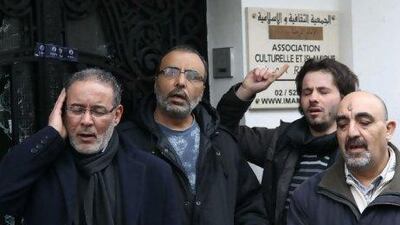ROTTERDAM, THE NETHERLANDS // An arson attack on a Shia mosque in Brussels in which the imam was killed may have been motivated by tensions between Muslim groups over the conflict in Syria.
Belgium's interior minister said yesterday that the suspect in custody had entered the mosque late on Monday "shouting about issues related to the Syrian conflict". The minister, Joelle Milquet, said the attack appeared to be linked to Sunni-Shia tensions in the Belgian capital.
Azedine Laghmich, an official at Al Rida mosque who was reportedly injured when he helped the imam in trying to extinguish the flames, said the attacker shouted "Salafist" slogans related to the conflict in Syria, where the mostly Alawite regime of President Bashar Al Assad is fighting mostly Sunni opponents.
The arson attack shocked Belgium's Muslim community of more than 600,000 and left many mourning for Abdallah Dadou, 46, a father of four who died from smoke inhalation. Mr Laghmich said the attacker stormed into the mosque wielding a knife and an axe, sprayed the interior with petrol and set it alight.
The head of the umbrella Muslim Executive of Belgium, Semsettin Ugurlu, called for calm in the Muslim community. "Whatever the reason, Salafist or otherwise, this attack is a terrible thing, something unacceptable. It is an assault on the peace and stability in Belgian society and in the Belgian Muslim community," he said.
It was up to the authorities, he said, to determine the motives behind the attack and also to evaluate whether security had been sufficient in light of previous Salafist threats against Al Rida mosque.
"The mosque had been under police surveillance because in the past there had been threats from this direction," Mr Ugurlu said.
Mrs Milquet, the interior minister, said Belgium would not become a battleground for groups fighting out foreign conflicts and that she would take measures to prevent further attacks.
The suspect told police that he was a Belgian Muslim, born in 1978, but his identity could not immediately be established because he did not carry any identification.
Most Muslims in Belgium are Sunni, with a relatively small Shiite minority. Tensions between the two groups have been on the rise in recent years over a variety of conflicts in the Islamic world, from Iraq to Yemen and Afghanistan.
Iman Lechkar, a researcher into interculturalism, migration and minorities research at the Catholic University in Leuven, said that mostly the two groups lived peacefully but that splits did exist.
"There are tensions because of the ideological differences that have been reinforced by geopolitical issues," she said, based on research that she has carried out in the communities.
She cautioned against the tendency to immediately blame small extremist groups of "neo-Salafists" for incidents such as at Al Rida mosque and said she had not noticed particular threats in the community over the events in Syria.
Even so, such a link was not unthinkable, she said. "Whether it is Syria or something else, nowadays people are easily influenced by what happens elsewhere. The global and the local dimensions very often come together."
It was not the first time that global tensions were played out within Belgium's Muslim community. Another incident in which an imam was killed occurred in 1989 when the Saudi-born Abdullah Muhammad Al Ahdal was shot dead inside the Grand Mosque in Brussels.
At the time, the killing was linked to the fatwa calling for the execution of the author Salman Rushdie, which the imam had opposed. But that link was never confirmed.
As in many other European countries, the presence of a growing Muslim community has also caused tensions within society. The right-wing movement Vlaams Belang, the Flemish Interest, picked up on the attack on its website and attached a warning against what it sees as the growing influence of Salafist groups in the Belgian Muslim community.
"Salafism is a very extremist tendency in Islam that rejects all things western: music, alcohol, make-up etc. The movement has an increasing number of adherents in our country and that is an ominous development," it said on the site.

